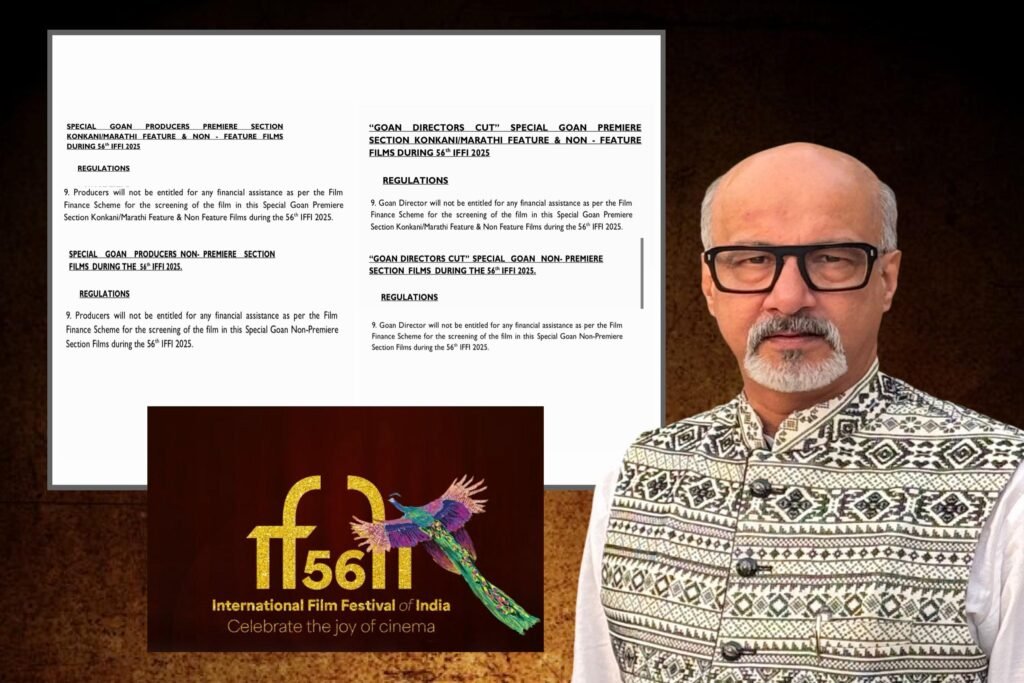Finance Scheme vs. Festival Rules: Goan Cinema Caught in Policy Conflict

Panaji : The Entertainment Society of Goa (ESG) is once again facing scrutiny over its policies, as contradictions in the Rules governing the Goan Section at the International Film Festival of India (IFFI) 2025 have raised concerns about the state’s commitment to promoting local cinema. Vishal Pai Cacode, a former Governing Body Member of ESG, has criticized the government’s stance on supporting Goan filmmakers, accusing it of undermining its own initiatives with policies that, instead of encouraging Konkani cinema, seem to be actively obstructing it.
Pai Cacode pointed to the Goa Film Finance Scheme of 2016, which promises additional financial assistance to Goan filmmakers whose work is selected for prestigious international festivals like IFFI. The scheme offers an incentive of ₹5 lakh for feature films and ₹2.5 lakh for non-feature films. However, according to Cacode, the regulations for the Goan Section at IFFI 2025 directly contradict this promise.
“While the Goa Film Finance Scheme clearly lays out these benefits to support Goan filmmakers in reaching global platforms, the regulations for IFFI 2025 have made the five Goan films selected this year ineligible for these very benefits. When the government says ‘support’ but the rules say ‘deny,’ it begs the question: What exactly is ESG’s policy?” Cacode said.
Cacode raised concerns that the government’s rhetoric of promoting Konkani cinema does not align with the reality of its policies, calling the discrepancy “bizarre.” He emphasized the confusion over the Chief Minister Dr. Pramod Sawant’s public assertions of promoting Konkani films, which are contradicted by ESG’s regulations. Cacode argued that the current rules appear specifically designed to block Goan filmmakers from receiving the financial support promised to them.
Adding further fuel to the fire, Cacode pointed to the controversial inclusion of the film Claudia in IFFI 2025. The film was initially rejected by the jury for the Indian Panorama Section, only to be accepted later under the Special Presentation or Gala Premiere categories. Cacode questioned the rationale behind this decision, especially in light of the film’s earlier rejection. “If Claudia, a film deemed ‘not good enough’ for Indian Panorama, is now being showcased through a special route, it raises concerns about the fairness of the selection process. Will this film be granted the financial benefits that the five Goan films are being denied?” he asked.
Cacode warned that if Claudia receives the financial assistance under the scheme while the officially selected Goan films do not, it would not only raise questions about favouritism but also about the transparency and credibility of IFFI as a festival. The Goan film community, which has long struggled for recognition and timely support, would see this as yet another example of how policies intended to uplift them fail to deliver.
In his statement, Cacode called for immediate clarification from both the ESG and the Government of Goa on whether the state is genuinely promoting Goan filmmakers or systematically sidelining them. “Until these contradictions are addressed and financial assistance is provided without bias, Goa’s Film Finance Scheme risks becoming just another well-intentioned policy that fails to serve the very people it was designed to support,” he concluded.






